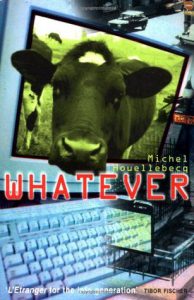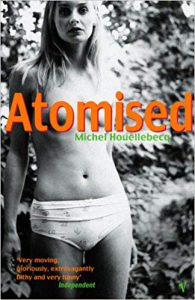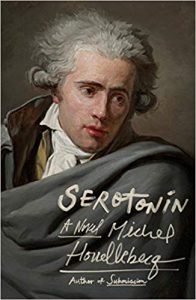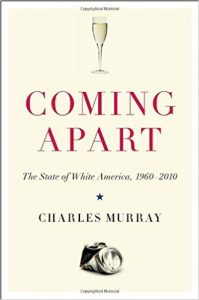Books
Michel Houellebecq: Populism's Prophet
Populism has been unpacked, dissected, defined, and analysed, and the results have all been discouraging.

In the wake of Brexit and the election of Donald Trump, more newspaper op-eds and opinion pieces in magazines catering to the “well-informed public” have been written about the populist phenomenon than any other topic. Populism has been unpacked, dissected, defined, and analysed, and the results have all been discouraging. Identifying the cause or causes of populism is no simple matter. Does populism stem from dissatisfaction with the economy, immigration, or some combination of issues? When surveys are taken of populist voters, these broad categories are used to determine the reason for a voter’s decision. Lost in these statistical analyses of populism, however, is any real understanding of the lives and motivations of the individuals who end up making political decisions. In an age of ubiquitous scientific polling and surveying, of commentary and opinion, it is curious that perhaps the most powerful and accurate examination of the forces behind the modern populist groundswell should come from a French novelist.
In the press, Michel Houellebecq has held the distinction of being France’s literary, right-wing enfant terrible. When interviewed, he is often rude and foul-mouthed—not to mention catatonically drunk. His politics are difficult to pin down, and he seems more interested in shocking interviewers than giving a faithful account of his views. Not fitting any predetermined labels, but preternaturally prescient in his social criticism, he has been called both a prophet and a populist. His 2016 novel Submission, which depicts the transformation of France into an Islamic state, was published on the eve of the Charlie Hebdo terrorist attack. He has also been credited with being among the first to identify an underclass of sexless, under-socialised young males, now commonly known as “Incels” (short for the involuntarily celibate). His most recent novel, Serotonin, which is due to be published in English this fall, focuses in part on the effects of European Union agricultural policy on local farmers, all while an intense debate over Brexit and the proper role of the European Union rages on. His praise of Donald Trump has also contributed to a reputation for having his finger on the pulse of the populist zeitgeist.

Far from coinciding with the populist moment, however, Houellebecq’s views have been developed for some time. Indeed, he has been writing furiously about Western socio-cultural malaise for the past 25 years. His first novel, Whatever, published in France in 1994, set the tone for his later work. It details the grim existence of a 30-year-old computer engineer who struggles to find meaning in his life, while waxing philosophically about the loss of human connection in western society. The novel also included the first explication of Houellebecq’s views on the post-sexual revolution “sexual marketplace.” Houellebecq reasons that the liberalisation of sexual relations, due both to changing societal attitudes and the invention of the birth control pill, have led to widespread sexual inequality; the attractive, more biologically fit elite have more sex than ever, while biological proletarians lead markedly less pleasurable lives, without even the consolation, as in previous eras, of a virtually guaranteed marriage supported by societal institutions. Rather than an isolated phenomenon, Houellebecq sees the sexual marketplace as a natural extension of the competition inherent in the capitalist market system, in which value is assigned to goods, services, and even people, to facilitate trade.
Houellebecq argues that the social structures which maintained Western hegemony by checking the societally harmful excesses of this competition, namely religion and the family unit, have been gradually lost to individualism and the market. Without any institutional checks on this competition, a growing number of individuals have been left behind. The recognition that one has lost out leads to despair and resentment, emotions which further destabilise society. For Houellebecq, this widespread “atomisation” of society is the principle cause of a perceived decline of the West. His evidence for this demise is the declining birth rates in Western countries. Unlike other broadly right-wing figures, however, Houellebecq is sceptical that the social stabilising force of Christianity can be called upon anytime soon, and he accepts the decline of religion’s influence over society as a logical consequence of scientific progress.
A description of Houellebecq’s thinking and its ramifications for our understanding of populism would be incomplete without an overview of some of his novels. Atomised, Houellebecq’s second—and most autobiographical—novel, provides the purest distillation of his views, while Serotonin, his most recent work, illustrates that these views may be changing subtly. Houellebecq was born on the French island of Reunion, 740 kilometres east of Madagascar. His mother, a French doctor, and his father, a ski instructor, abandoned him as a child, sending him to live with his maternal grandmother in Algeria. Later, he was sent to live with his paternal grandmother in France, with whom he became very close; he would later take her maiden name, Houellebecq, as his nom de plume. In Atomised, two half-brothers, Bruno and Michel, are also left to the care of their maternal and paternal grandmothers, while their mother, described as a beautiful French doctor, sets out to discover herself, all the while neglecting her two children. It is unclear how much of this neglect is fictional, but a public feud in 2008 between Houellebecq and his then eighty-three-year-old mother suggests a profoundly acrimonious relationship.

In Atomised, Houellebecq is chiefly concerned with examining and evaluating the competitive individualism that replaces religion and the family unit in an “atomised” society. He also attempts to demonstrate how this competition among individuals negatively impacts the lives of the weakest in society, or those placed in difficult circumstances. He is particularly critical of the notion that a society with greater individualism, free of the restrictive forces of religion and family, will be more happy, because it is closer to nature. As a child, Michel is horrified by the cruelty he witnesses on a weekly television programme called The Animal Kingdom. He is appalled as graceful gazelles and antelopes, in large part the old and sick, are torn to pieces by lions. The voice of Claude Darget, the narrator of the programme, is described as “pompous” and “half-witted” as he speaks of nature with “unjustifiable admiration.” For Houellebecq, nature is a term that can be used to sanction the most despicable behaviour.
Houellebecq is also clear about what he believes constitutes moral virtue. Amidst the profanity and graphic depictions of sex, both commonplace in a Houellebecq novel, we are given a tender description of Michel’s grandmother, who does her best to raise him, alone and suffering from the effects of old age and ill health: “Historically, such human beings have existed. Human beings who have worked—worked hard—all their lives with no other motive than their love and devotion…Human beings who have no sense of having made any sacrifice; who cannot imagine any other way of life than giving their lives for others…” This behaviour may be natural for select human beings, shaped by the right kind of society, but Houellebecq is certain this behaviour is not produced in nature.

Bruno, Michel’s half-brother, has an even more difficult childhood. He is brutally bullied at boarding school and overeats to cope with his misery. Houellebecq compares the dominance hierarchy of the animal kingdom to the social dynamics of Bruno’s school, where the strong adolescents mercilessly bully the weak. As he grows older, Bruno occasionally spends time with his mother at various hippie communes, yet he is unable to partake in the orgiastic activities because, like his brother, he is not “enough of an animal” to fit in; his moral sense renders him too remote from a more natural life.
As Bruno and Michel age it becomes clear that their trauma has rendered them incapable of love. Bruno develops an obsession with sex, and, like a perpetual adolescent, he is unable to experience anything other than his own desires. Michel comes close to experiencing intimacy, but he is unable to reciprocate the feelings of the one woman who truly loves him. His would-be lover is also frustrated by circumstance. She is unsure whether to follow society’s advice and enter the dating market for a period of time in order to choose a partner more in line with the criteria of the competitive market, or to start a family with the first man she truly loves. The prudence of modern society ultimately triumphs, and they drift apart.
Michel, who later becomes a famous scientist, is convinced that without religion and the family to check the advance of individualism, there will be a return to nature in the form of intense, antisocial competition fuelled by vanity and ego. Concluding that the power of religion to guide and order society has been lost forever, he makes a discovery at the end of the book that allows humans to create a separate species of asexually reproducing proto-humans, thus freeing the species from the incessant sexual desire and competition that he believes will be the cause of societal collapse. In the future, original humans are gradually replaced by this new species. The book, as we discover at the end of the novel, was written as a memorial to the tragic, but unavoidable, sufferings of humanity. Science is able to overcome the limits of human nature to achieve utopia, but only by destroying humanity.

Compared to Atomised, Houellebecq’s new novel, Serotonin, is focused less on the causes of discontent in modern society than a description of some of its discontented characters as they make their way through the wasteland. The plot centres around Florent-Claude Labrouste, a 46-year-old agricultural engineer who has come to the realisation—not unusual for Houellebecq’s characters—that he no longer has any reason to live. To cope with his depression, he takes a fictional SSRI antidepressant called Captorix, which is said to be even more potent than previous iterations of the drug. The medication keeps him from despair, but it cannot reawaken any of his old passion for life. Unlike Bruno and Michel, his upbringing is in an intact middle class family, and the tragedy he has experienced in life is not extraordinary. He is capable of love but inevitably destroys his relationships through neglect and self-destructive action, brought about by a series of events or impulses he is unable to comprehend. Like Bruno and Michel, he is trapped in the current of society and circumstance, powerless to substantially alter his future for better or worse.
After a miserable trip to Spain with his girlfriend, he decides to run away from life. He abandons his girlfriend, his job, and his apartment. His possessions amount to an 1100-gram MacBook Air filled with the digital records of modern life and a suitcase. As he travels around France, he recounts his previous moments of happiness. It soon becomes clear he has no purpose in abandoning his previous life, except to contemplate how his life has ended in disappointment.
As he reflects on his one great love, Florent-Claude considers that marriage was simply not in his programming. Though he had an opportunity and an inclination to marry, he found himself unable to go through with it. His girlfriend was young, and they both were concerned with establishing themselves professionally, though Florent-Claude admits neither of them had any understanding of what this meant. As with Michel in Atomised, personal happiness is subordinate to the forces of society. Throughout the novel, Houellebecq neatly plays with the idea that the rationale for our decisions at important junctions in life can be traced to the rationale behind the society in which we live. When this rationale is mistaken, so are our decisions.
In his aimless quest he visits an old friend from university, Almyric, a dairy farmer in Normandy struggling to make a living and hold on to his farm. After graduating, Almyric decided against a career at a food conglomerate, opting to pursue a traditional life of farming on one of his family’s estates. But Almyric soon finds that intense competition from larger dairy producers has rendered his dream all but impossible. After the EU milk quota and its subsidies for smaller dairy producers are abolished in 2015, he loses his farm and his wife abandons him. Filled with despair, Almyric and other dairy farmers, also driven out of business, stage an armed insurrection, which is as bizarre as it is futile and nihilistic.
In a dark twist, Florent-Claude comes close to carrying out an act even more nihilistic than the dairy farmers’ revolt. The act is so cruel one wonders why Houellebecq would bother writing through the eyes of someone so intensely unlikeable. It is not until the epilogue that he shows his hand, and the point of the novel becomes clear. The epilogue of Serotonin is striking for its moral tone—and for its appeal to hope. Unlike in Atomised, where the human condition is deemed so tragic that salvation is only possible through its destruction, Houellebecq considers the possibility of compassion and brotherly love as solutions to the moral crisis he sees in the West. The novel’s redemptive conclusion, replete with explicit religious significance, offers the prospect of salvation in an act of Christ-like self-sacrifice.

In his novels, Houellebecq attempts to depict how experiences once deemed essential to individual and societal contentment—falling in love, raising a family, having an occupation that brings some degree of daily satisfaction and meaning—are being closed off to an ever-increasing portion of the population. Left in place of these experiences is a society of modern, liberal individuals, who only really understand how to compete like animals. Even for those like Florent-Claude with the ability to succeed competitively, life—devoid of the deeper, human connections that give it meaning—becomes an absurd exercise in daily suffering. For those unable to compete, there is the additional pain of resentment—consisting of both jealousy and shame that one is not good enough.
It is this kind of discontent and resentment, so well articulated by Houellebecq, that is lurking beneath the surface of populism. Indeed, Houellebecq’s work has been a commercial success in part because of its convincing portrayal of this particular kind of anguish. He is able to articulate the grievances and general feeling of disaffection with modern life that are arguably responsible for a political movement. However, it does not follow that all these grievances are justified. If one is to take Houellebecq’s novels seriously, one must also address their oversights and oversimplifications.
To begin with, Houellebecq tends to gloss over the benefits of competitive behaviour. He spends a great deal of time discussing emotional dissatisfaction but ignores the enormous increase in material wellbeing partially attributable to the competitive forces he derides. If he believes that some material wellbeing must be sacrificed for the benefit of the community, he is vague about how much must be done away with and from where it should be taken. The EU milk quota, which features prominently in Serotonin, was no doubt a benefit to some small dairy farmers, but an economist might convincingly argue that its inefficiency hurt society as a whole. Houellebecq never grapples with the difficulty of balancing special interests with the interests of the broader community.
It is also unclear whether the happiness of Houellebecq’s characters is really so dependent on prevailing social norms or societal institutions. Houellebecq devotes a great deal of time to the sexual marketplace and the resentment that sexual inequality produces, but the old-fashioned institution of marriage did not alter the fact that some were born more physically attractive than others. Resentment and jealousy would seem to have their place in this system as well, and it is hard to imagine a marriage or a family being any consolation to someone as cynical as a Houellebecq protagonist. Indeed, the intense pessimism of Houellebecq’s novels often leads one to wonder whether Houellebecq is merely a critic of modern society or, like his idol Schopenhauer, of life in general.
Finally, there is the argument that greater individualism and social freedom have increased our ability to seek a deeper, more personal satisfaction in life. Houellebecq’s characters are either disadvantaged in some way or incapable of finding happiness. There are no doubt other members of society who would find rigid community-based life, with only a handful of occupations to choose from, too stifling. Differences in character, or even appearance, are often cruelly repressed in small communities, and many who grow up in small towns seek the refuge of the city to escape this ill-treatment. Ironically, it was the fear of becoming a true individual, the failure of recognising through self-knowledge the key to his own happiness, that is most to blame for Florent-Claude’s ruin in Serotonin.
Despite these serious flaws, few would dispute that Houellebecq is writing in an age of increasing inequality. At first glance, Florent-Claude may seem like an unsympathetic character for squandering his material advantages, but Houellebecq is adamant that a large percentage of people are simply incompatible with the competition of modern life. This inequality between people like Florent-Claude and others is not related to wealth, but to the richness of our lived experience within the context of society. This is influenced by everything from our physical appearance, personality, intelligence, and social status. Income inequality is by far the most discussed variety of inequality, but Houellebecq does not limit himself to discussing economics, and he is not timid about bringing to light the uncomfortable fears and motivations that are closest to our hearts. Houellebecq’s view of human nature implies that even if income inequality were reduced, human vanity would find other ways of using choice and taste to perpetuate differences. Natural competition, as a function of unchecked individualism, would continue to dominate, and we would still be left with an inequality of lived experience.

This insight touches upon the uncomfortable reality that decisions we make in our personal lives, such as where we study, whom we marry and where we live, have an effect on public life and contribute to this inequality in lived experience. Unfortunately, this puts the blame for inequality on an uncomfortably large portion of privileged individuals. In Charles Murray’s 2011 book Coming Apart, Murray describes the effect of cognitive homogamy, or the tendency for individuals with similar cognitive ability and educational backgrounds to marry and have children, on the stratification of American society. As this trend towards assortative mating has increased, the tastes and behaviours of different groups have grown apart. This has become so extreme that today, one can make the case that separate cultures have developed. These groups have even grown apart geographically, and one’s postal code is now an eerily reliable indicator of not only one’s income but also one’s social status.
Competition and inequality are also more visible today. A disadvantaged young person, or a loveless computer technician, such as in Houellebecq’s novel Whatever, need only log on to Instagram to be bombarded with images of the natural inequality of life. The pace of competition and the need to show off what one has to keep up with others also incentivises the privileged to be even more shameless and ostentatious in displaying their advantages. Despite recent criticism of social media, there are enormous incentives for the status quo to remain as it is. Commercially, imagery is vital for creating a perception in the minds of consumers about a product or service. Through social media, Guy Debord’s assertion in Society of the Spectacle that, in commercial life, the value of having ultimately becomes the appearance of having, has a new, amplified meaning today. We are also personally incentivised by vanity and our wish to keep up appearances to continue engaging with social media. We could stop, but we would be afraid of losing to the competition.
Even if one is satisfied that populism is an expression of discontent and resentment stemming from the competition and resulting inequality in society, it is difficult to know what ought to be done. Political discussion seems more focused on labelling and demeaning other groups than finding solutions. But perhaps this is because the solution to the present quandary lies outside the realm of politics altogether. Individually reflecting on the broader consequences of one’s actions, doing one’s best to be humble about the advantages one possesses, and having a genuine compassion for the suffering and insecurities of others may sound banal, but these points are also rarely discussed—possibly because they place a responsibility on all individuals, especially the most privileged among us.
It is interesting to note, for instance, that few pundits ever turn the mirror on their viewers or readers, and one wonders whether income inequality is far and wide the most discussed form of inequality, because it theoretically only requires an act of Congress or Parliament to change, rather than personal engagement with the “others” whom we can label and examine from the safe distance of scientific surveys and polls. As an agnostic, Houellebecq does not invoke Christ’s message of love as an evangelist, but rather as a concerned spectator who sees the possibility of redemption in a simple but powerful teaching of human compassion. The technocratic solution of collecting survey data and labelling and analysing individuals as part of a group, on the other hand, only serves to keep the discussion elevated above the individual, human concerns that are, at bottom, the source of the discontent.
On the other hand, the often overwrought condemnation of modern life in Houellebecq’s novels illustrates the danger of acquiescing to the demands of populism; it is easy to imagine how populism fuelled by resentment could lead to all the wrong kinds of reform. There is also the danger of rushed thinking about complex issues and the tendency to ignore the positive aspects of the society in which we live. Few of even the most ardent modern populists would wish to live in a society that no longer tolerated—or even celebrated—individual differences and choice.
It is illustrative of the enduring power of the novel that a debate so mired in abstraction and lofty rhetoric could be brought down to earth by characters who, although fictional, share a sliver of reality and lived experience with the reader. Even if we live privileged lives, we can empathise with the childhood struggles of Bruno and Michel, or Florent-Claude’s search for love and meaning. This empathy can help us understand the discontent of others and maybe even some of the reasons for their vastly different political decisions. This emotional connection is more powerful than surveys or punditry, and Houellebecq’s novels, though flawed, deserve praise, as well as our attention, for giving a tired debate a fresh and more human perspective.






